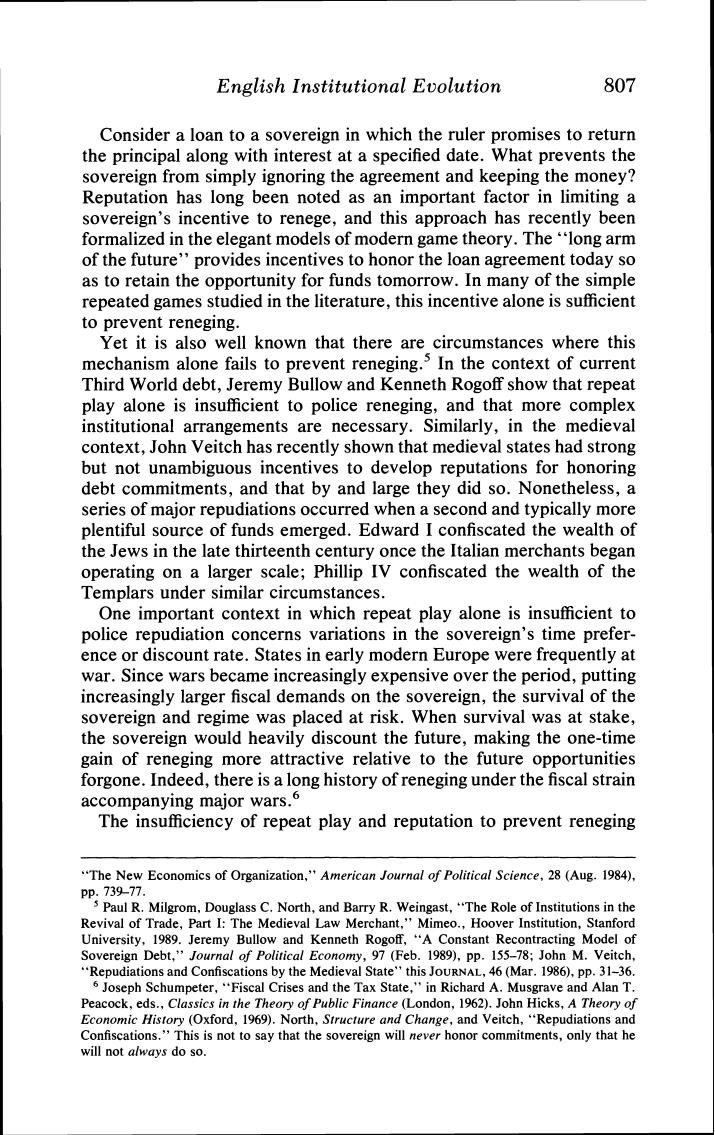正在加载图片...

English Institutional Evolution 807 Consider a loan to a sovereign in which the ruler promises to return the principal along with interest at a specified date.What prevents the sovereign from simply ignoring the agreement and keeping the money? Reputation has long been noted as an important factor in limiting a sovereign's incentive to renege,and this approach has recently been formalized in the elegant models of modern game theory.The"'long arm of the future''provides incentives to honor the loan agreement today so as to retain the opportunity for funds tomorrow.In many of the simple repeated games studied in the literature,this incentive alone is sufficient to prevent reneging. Yet it is also well known that there are circumstances where this mechanism alone fails to prevent reneging.3 In the context of current Third World debt,Jeremy Bullow and Kenneth Rogoff show that repeat play alone is insufficient to police reneging,and that more complex institutional arrangements are necessary.Similarly,in the medieval context,John Veitch has recently shown that medieval states had strong but not unambiguous incentives to develop reputations for honoring debt commitments,and that by and large they did so.Nonetheless,a series of major repudiations occurred when a second and typically more plentiful source of funds emerged.Edward I confiscated the wealth of the Jews in the late thirteenth century once the Italian merchants began operating on a larger scale;Phillip IV confiscated the wealth of the Templars under similar circumstances. One important context in which repeat play alone is insufficient to police repudiation concerns variations in the sovereign's time prefer- ence or discount rate.States in early modern Europe were frequently at war.Since wars became increasingly expensive over the period,putting increasingly larger fiscal demands on the sovereign,the survival of the sovereign and regime was placed at risk.When survival was at stake, the sovereign would heavily discount the future,making the one-time gain of reneging more attractive relative to the future opportunities forgone.Indeed,there is a long history of reneging under the fiscal strain accompanying major wars.6 The insufficiency of repeat play and reputation to prevent reneging "The New Economics of Organization,"American Journal of Political Science,28 (Aug.1984), pp.73977. 3 Paul R.Milgrom,Douglass C.North,and Barry R.Weingast,"The Role of Institutions in the Revival of Trade,Part I:The Medieval Law Merchant,"Mimeo.,Hoover Institution,Stanford University,1989.Jeremy Bullow and Kenneth Rogoff,"'A Constant Recontracting Model of Sovereign Debt,"Journal of Political Economy,97 (Feb.1989),pp.155-78;John M.Veitch, "Repudiations and Confiscations by the Medieval State'this JoURNAL,46(Mar.1986),pp.31-36. 6 Joseph Schumpeter,Fiscal Crises and the Tax State,"in Richard A.Musgrave and Alan T. Peacock,eds.,Classics in the Theory of Public Finance (London,1962).John Hicks,A Theory of Economic History (Oxford,1969).North,Structure and Change,and Veitch,"Repudiations and Confiscations."This is not to say that the sovereign will never honor commitments,only that he will not always do so.English Institutional Evolution Consider a loan to a sovereign in which the ruler promises to return the principal along with interest at a specified date. What prevents the sovereign from simply ignoring the agreement and keeping the money? Reputation has long been noted as an important factor in limiting a sovereign's incentive to renege, and this approach has recently been formalized in the elegant models of modern game theory. The "long arm of the future" provides incentives to honor the loan agreement today so as to retain the opportunity for funds tomorrow. In many of the simple repeated games studied in the literature, this incentive alone is sufficient to prevent reneging. Yet it is also well known that there are circumstances where this mechanism alone fails to prevent reneging5 In the context of current Third World debt, Jeremy Bullow and Kenneth Rogoff show that repeat play alone is insufficient to police reneging, and that more complex institutional arrangements are necessary. Similarly, in the medieval context, John Veitch has recently shown that medieval states had strong but not unambiguous incentives to develop reputations for honoring debt commitments, and that by and large they did so. Nonetheless, a series of major repudiations occurred when a second and typically more plentiful source of funds emerged. Edward I confiscated the wealth of the Jews in the late thirteenth century once the Italian merchants began operating on a larger scale; Phillip IV confiscated the wealth of the Templars under similar circumstances. One important context in which repeat play alone is insufficient to police repudiation concerns variations in the sovereign's time preference or discount rate. States in early modern Europe were frequently at war. Since wars became increasingly expensive over the period, putting increasingly larger fiscal demands on the sovereign, the survival of the sovereign and regime was placed at risk. When survival was at stake, the sovereign would heavily discount the future, making the one-time gain of reneging more attractive relative to the future opportunities forgone. Indeed, there is a long history of reneging under the fiscal strain accompanying major wars.6 The insufficiency of repeat play and reputation to prevent reneging "The New Economics of Organization," American Journal of Political Science, 28 (Aug. 1984), pp. 739-77. Paul R. Milgrom, Douglass C. North, and Barry R. Weingast, "The Role of Institutions in the Revival of Trade, Part I: The Medieval Law Merchant," Mimeo., Hoover Institution, Stanford University, 1989. Jeremy Bullow and Kenneth Rogoff, "A Constant Recontracting Model of Sovereign Debt," Journal of Political Economy, 97 (Feb. 1989), pp. 155-78; John M. Veitch, "Repudiations and Confiscations by the Medieval State" this JOURNAL, 46 (Mar. 1986), pp. 31-36. Joseph Schumpeter, "Fiscal Crises and the Tax State," in Richard A. Musgrave and Alan T. Peacock, eds., Classics in the Theory of Public Finance (London, 1962). John Hicks, A Theory of Economic History (Oxford, 1969). North, Structure and Change, and Veitch, "Repudiations and Confiscations." This is not to say that the sovereign will never honor commitments, only that he will not always do so